LEGL201 Company Law: Directors' Fiduciary Duties and Case Analysis
VerifiedAdded on 2022/12/12
|7
|1259
|11
Report
AI Summary
This report examines the fiduciary duties of company directors, specifically focusing on sections 180(1), 180(2), and 181 of the Corporations Act. The assignment analyzes a case study involving Wild Cat Mining Ltd and its directors, Bill, Sam, and Rubin. It explores the directors' responsibilities in exercising care, diligence, and acting in good faith, as well as the application of the business judgment rule. The report references key cases, including ASIC v. Flugge (No2) and Greenhalgh v. Arderne Cinemas Ltd, to illustrate the legal principles. The analysis considers whether Bill and Sam breached their fiduciary duties by continuing exploration activities despite financial losses and the potential defense available to them under the business judgment rule. The conclusion summarizes the conditions under which the directors could be protected from liability.
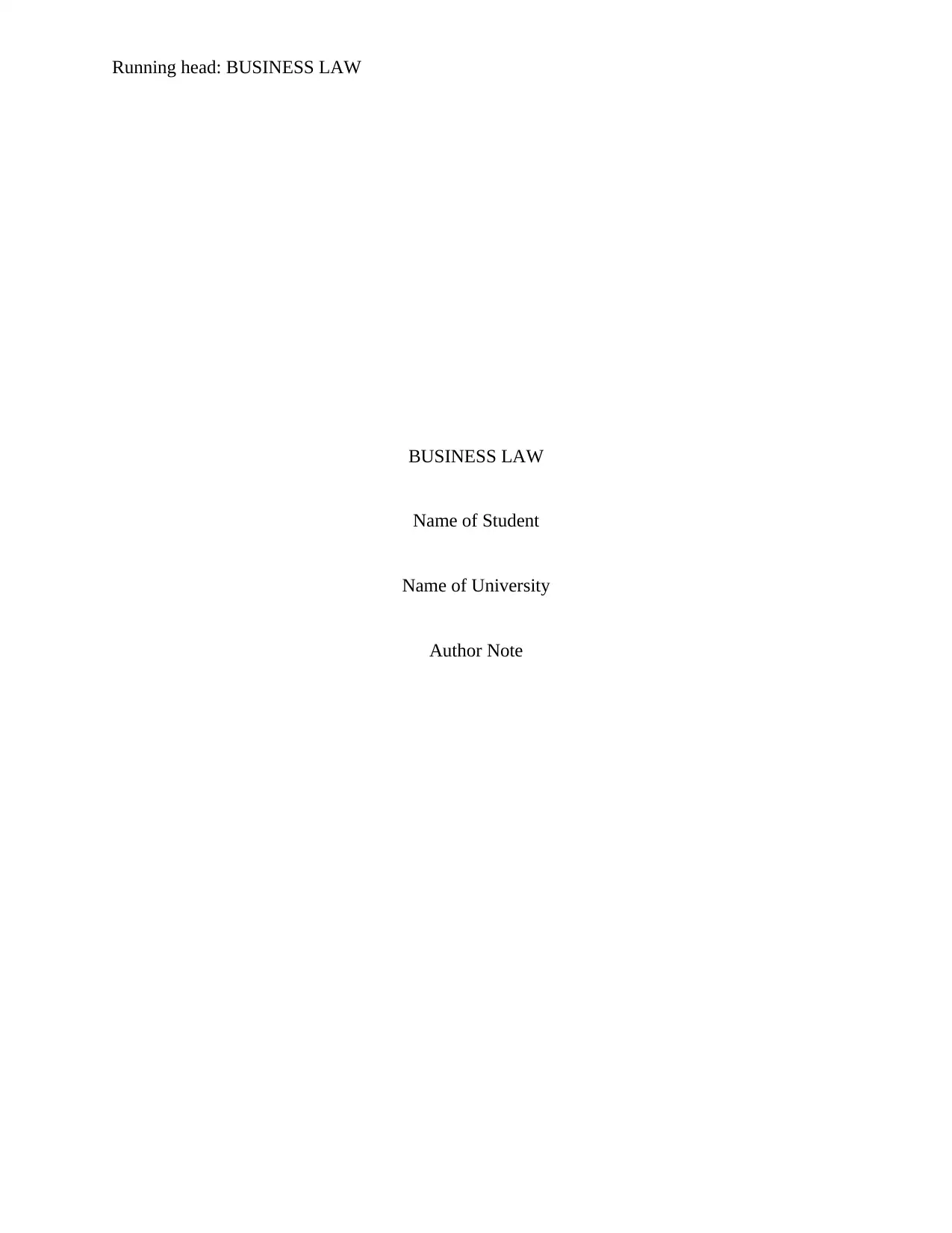
Running head: BUSINESS LAW
BUSINESS LAW
Name of Student
Name of University
Author Note
BUSINESS LAW
Name of Student
Name of University
Author Note
Paraphrase This Document
Need a fresh take? Get an instant paraphrase of this document with our AI Paraphraser
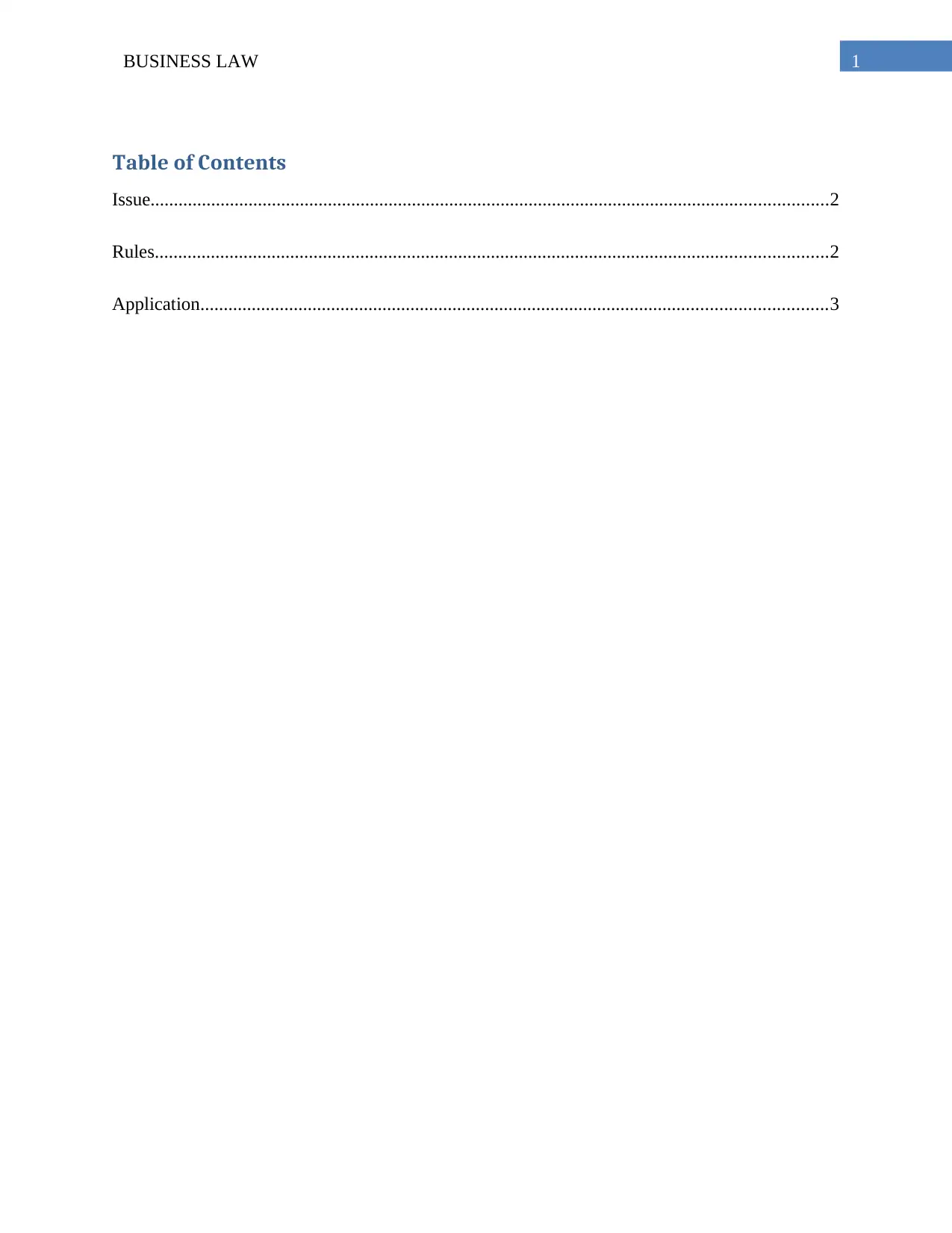
1BUSINESS LAW
Table of Contents
Issue.................................................................................................................................................2
Rules................................................................................................................................................2
Application......................................................................................................................................3
Table of Contents
Issue.................................................................................................................................................2
Rules................................................................................................................................................2
Application......................................................................................................................................3
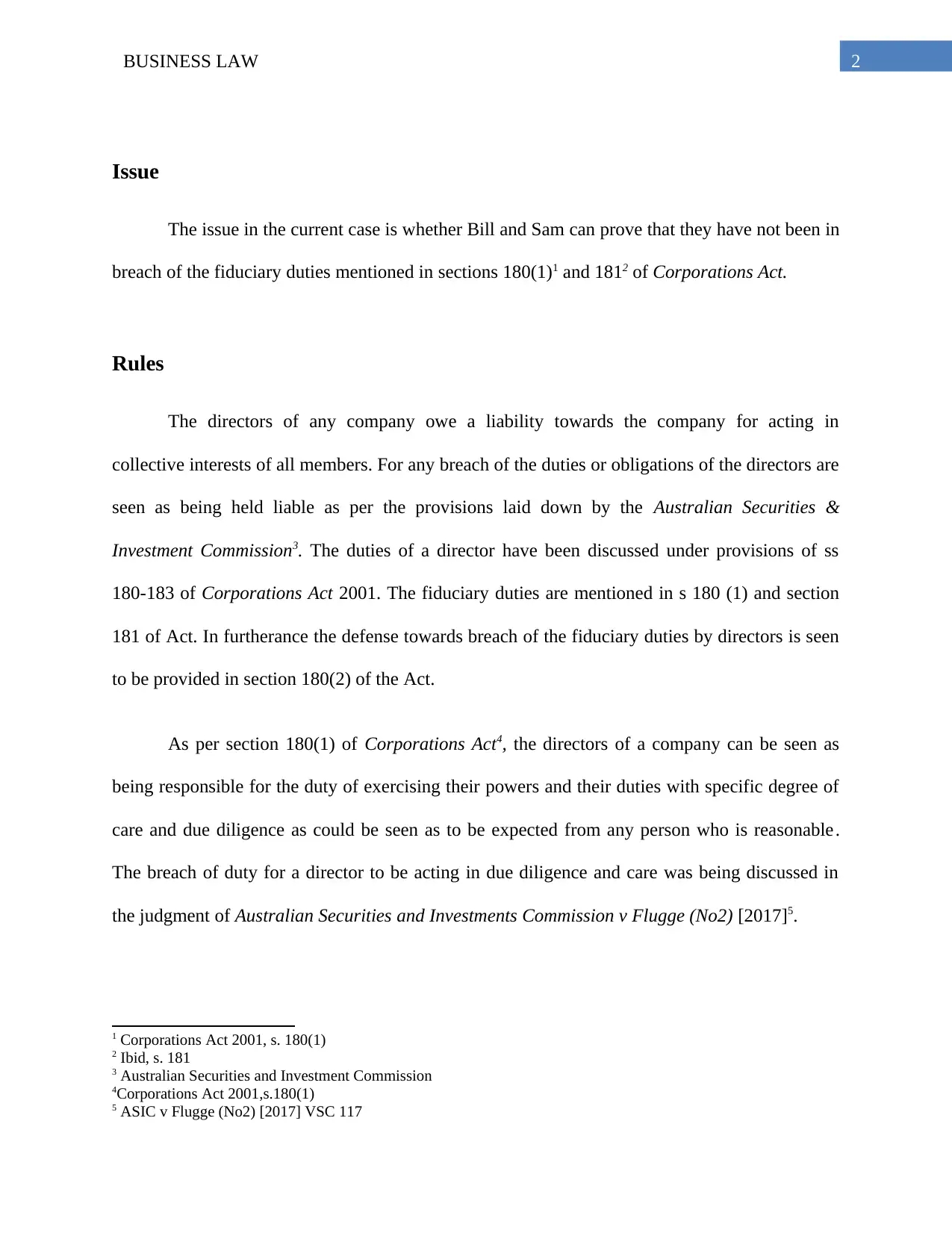
2BUSINESS LAW
Issue
The issue in the current case is whether Bill and Sam can prove that they have not been in
breach of the fiduciary duties mentioned in sections 180(1)1 and 1812 of Corporations Act.
Rules
The directors of any company owe a liability towards the company for acting in
collective interests of all members. For any breach of the duties or obligations of the directors are
seen as being held liable as per the provisions laid down by the Australian Securities &
Investment Commission3. The duties of a director have been discussed under provisions of ss
180-183 of Corporations Act 2001. The fiduciary duties are mentioned in s 180 (1) and section
181 of Act. In furtherance the defense towards breach of the fiduciary duties by directors is seen
to be provided in section 180(2) of the Act.
As per section 180(1) of Corporations Act4, the directors of a company can be seen as
being responsible for the duty of exercising their powers and their duties with specific degree of
care and due diligence as could be seen as to be expected from any person who is reasonable.
The breach of duty for a director to be acting in due diligence and care was being discussed in
the judgment of Australian Securities and Investments Commission v Flugge (No2) [2017]5.
1 Corporations Act 2001, s. 180(1)
2 Ibid, s. 181
3 Australian Securities and Investment Commission
4Corporations Act 2001,s.180(1)
5 ASIC v Flugge (No2) [2017] VSC 117
Issue
The issue in the current case is whether Bill and Sam can prove that they have not been in
breach of the fiduciary duties mentioned in sections 180(1)1 and 1812 of Corporations Act.
Rules
The directors of any company owe a liability towards the company for acting in
collective interests of all members. For any breach of the duties or obligations of the directors are
seen as being held liable as per the provisions laid down by the Australian Securities &
Investment Commission3. The duties of a director have been discussed under provisions of ss
180-183 of Corporations Act 2001. The fiduciary duties are mentioned in s 180 (1) and section
181 of Act. In furtherance the defense towards breach of the fiduciary duties by directors is seen
to be provided in section 180(2) of the Act.
As per section 180(1) of Corporations Act4, the directors of a company can be seen as
being responsible for the duty of exercising their powers and their duties with specific degree of
care and due diligence as could be seen as to be expected from any person who is reasonable.
The breach of duty for a director to be acting in due diligence and care was being discussed in
the judgment of Australian Securities and Investments Commission v Flugge (No2) [2017]5.
1 Corporations Act 2001, s. 180(1)
2 Ibid, s. 181
3 Australian Securities and Investment Commission
4Corporations Act 2001,s.180(1)
5 ASIC v Flugge (No2) [2017] VSC 117
⊘ This is a preview!⊘
Do you want full access?
Subscribe today to unlock all pages.

Trusted by 1+ million students worldwide
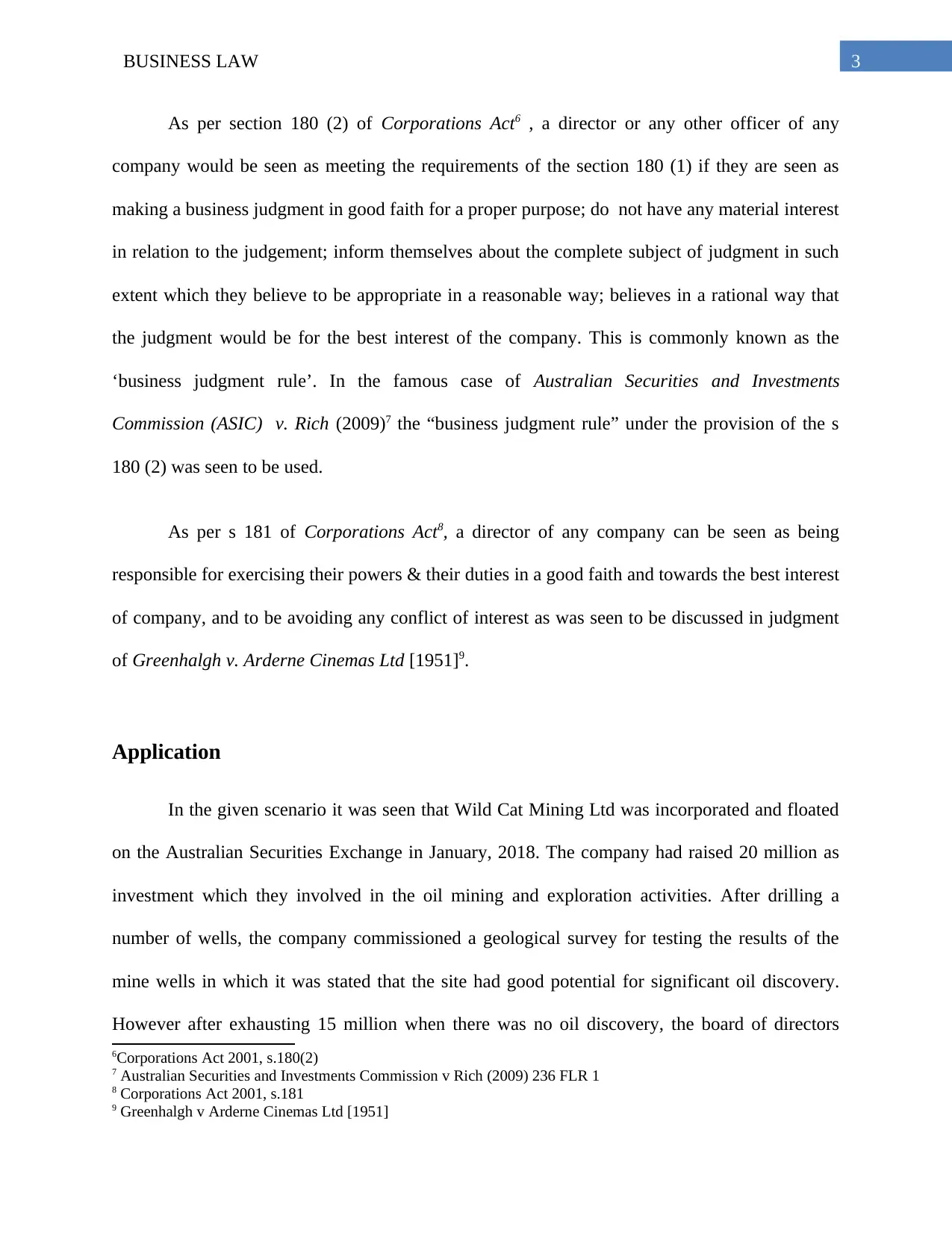
3BUSINESS LAW
As per section 180 (2) of Corporations Act6 , a director or any other officer of any
company would be seen as meeting the requirements of the section 180 (1) if they are seen as
making a business judgment in good faith for a proper purpose; do not have any material interest
in relation to the judgement; inform themselves about the complete subject of judgment in such
extent which they believe to be appropriate in a reasonable way; believes in a rational way that
the judgment would be for the best interest of the company. This is commonly known as the
‘business judgment rule’. In the famous case of Australian Securities and Investments
Commission (ASIC) v. Rich (2009)7 the “business judgment rule” under the provision of the s
180 (2) was seen to be used.
As per s 181 of Corporations Act8, a director of any company can be seen as being
responsible for exercising their powers & their duties in a good faith and towards the best interest
of company, and to be avoiding any conflict of interest as was seen to be discussed in judgment
of Greenhalgh v. Arderne Cinemas Ltd [1951]9.
Application
In the given scenario it was seen that Wild Cat Mining Ltd was incorporated and floated
on the Australian Securities Exchange in January, 2018. The company had raised 20 million as
investment which they involved in the oil mining and exploration activities. After drilling a
number of wells, the company commissioned a geological survey for testing the results of the
mine wells in which it was stated that the site had good potential for significant oil discovery.
However after exhausting 15 million when there was no oil discovery, the board of directors
6Corporations Act 2001, s.180(2)
7 Australian Securities and Investments Commission v Rich (2009) 236 FLR 1
8 Corporations Act 2001, s.181
9 Greenhalgh v Arderne Cinemas Ltd [1951]
As per section 180 (2) of Corporations Act6 , a director or any other officer of any
company would be seen as meeting the requirements of the section 180 (1) if they are seen as
making a business judgment in good faith for a proper purpose; do not have any material interest
in relation to the judgement; inform themselves about the complete subject of judgment in such
extent which they believe to be appropriate in a reasonable way; believes in a rational way that
the judgment would be for the best interest of the company. This is commonly known as the
‘business judgment rule’. In the famous case of Australian Securities and Investments
Commission (ASIC) v. Rich (2009)7 the “business judgment rule” under the provision of the s
180 (2) was seen to be used.
As per s 181 of Corporations Act8, a director of any company can be seen as being
responsible for exercising their powers & their duties in a good faith and towards the best interest
of company, and to be avoiding any conflict of interest as was seen to be discussed in judgment
of Greenhalgh v. Arderne Cinemas Ltd [1951]9.
Application
In the given scenario it was seen that Wild Cat Mining Ltd was incorporated and floated
on the Australian Securities Exchange in January, 2018. The company had raised 20 million as
investment which they involved in the oil mining and exploration activities. After drilling a
number of wells, the company commissioned a geological survey for testing the results of the
mine wells in which it was stated that the site had good potential for significant oil discovery.
However after exhausting 15 million when there was no oil discovery, the board of directors
6Corporations Act 2001, s.180(2)
7 Australian Securities and Investments Commission v Rich (2009) 236 FLR 1
8 Corporations Act 2001, s.181
9 Greenhalgh v Arderne Cinemas Ltd [1951]
Paraphrase This Document
Need a fresh take? Get an instant paraphrase of this document with our AI Paraphraser
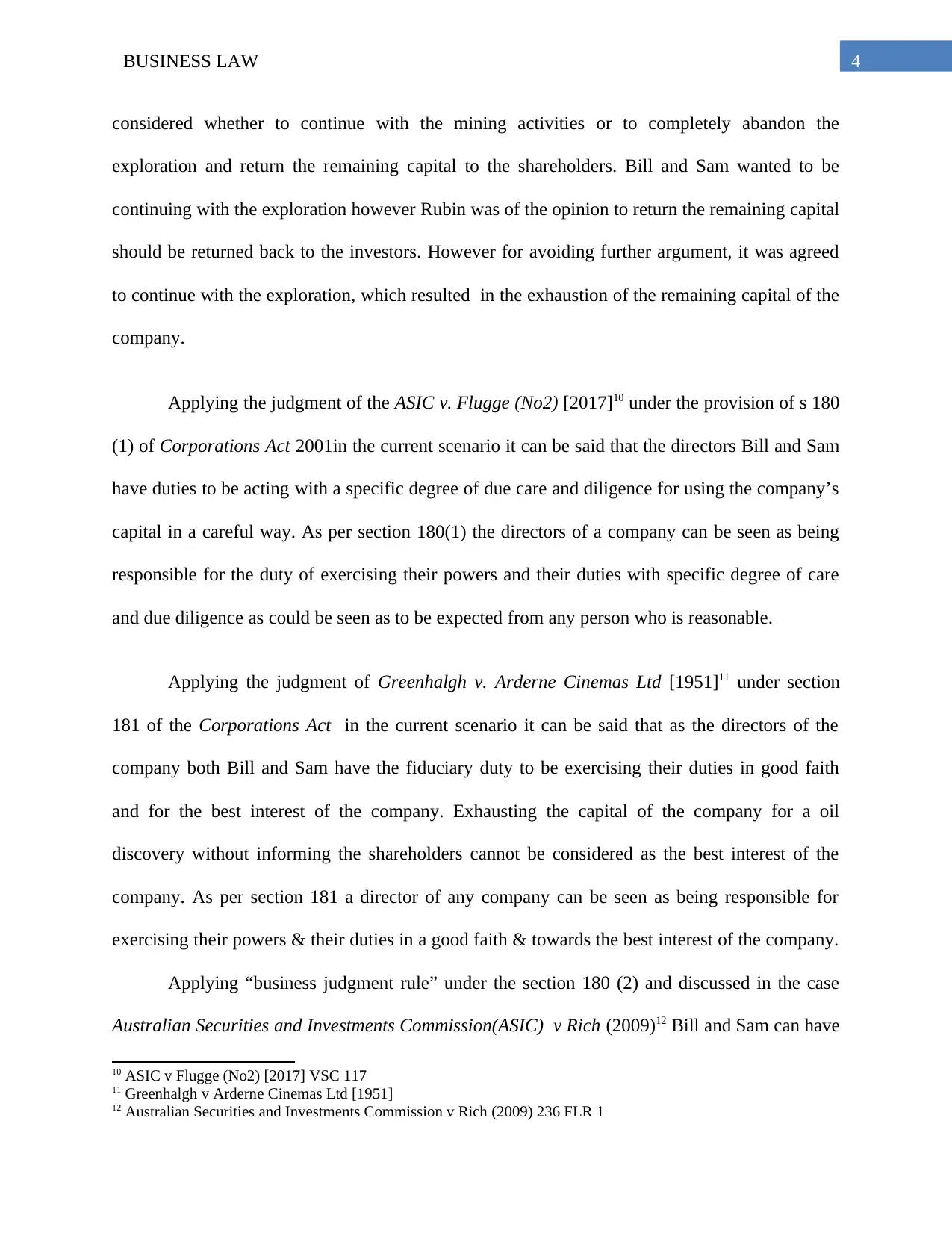
4BUSINESS LAW
considered whether to continue with the mining activities or to completely abandon the
exploration and return the remaining capital to the shareholders. Bill and Sam wanted to be
continuing with the exploration however Rubin was of the opinion to return the remaining capital
should be returned back to the investors. However for avoiding further argument, it was agreed
to continue with the exploration, which resulted in the exhaustion of the remaining capital of the
company.
Applying the judgment of the ASIC v. Flugge (No2) [2017]10 under the provision of s 180
(1) of Corporations Act 2001in the current scenario it can be said that the directors Bill and Sam
have duties to be acting with a specific degree of due care and diligence for using the company’s
capital in a careful way. As per section 180(1) the directors of a company can be seen as being
responsible for the duty of exercising their powers and their duties with specific degree of care
and due diligence as could be seen as to be expected from any person who is reasonable.
Applying the judgment of Greenhalgh v. Arderne Cinemas Ltd [1951]11 under section
181 of the Corporations Act in the current scenario it can be said that as the directors of the
company both Bill and Sam have the fiduciary duty to be exercising their duties in good faith
and for the best interest of the company. Exhausting the capital of the company for a oil
discovery without informing the shareholders cannot be considered as the best interest of the
company. As per section 181 a director of any company can be seen as being responsible for
exercising their powers & their duties in a good faith & towards the best interest of the company.
Applying “business judgment rule” under the section 180 (2) and discussed in the case
Australian Securities and Investments Commission(ASIC) v Rich (2009)12 Bill and Sam can have
10 ASIC v Flugge (No2) [2017] VSC 117
11 Greenhalgh v Arderne Cinemas Ltd [1951]
12 Australian Securities and Investments Commission v Rich (2009) 236 FLR 1
considered whether to continue with the mining activities or to completely abandon the
exploration and return the remaining capital to the shareholders. Bill and Sam wanted to be
continuing with the exploration however Rubin was of the opinion to return the remaining capital
should be returned back to the investors. However for avoiding further argument, it was agreed
to continue with the exploration, which resulted in the exhaustion of the remaining capital of the
company.
Applying the judgment of the ASIC v. Flugge (No2) [2017]10 under the provision of s 180
(1) of Corporations Act 2001in the current scenario it can be said that the directors Bill and Sam
have duties to be acting with a specific degree of due care and diligence for using the company’s
capital in a careful way. As per section 180(1) the directors of a company can be seen as being
responsible for the duty of exercising their powers and their duties with specific degree of care
and due diligence as could be seen as to be expected from any person who is reasonable.
Applying the judgment of Greenhalgh v. Arderne Cinemas Ltd [1951]11 under section
181 of the Corporations Act in the current scenario it can be said that as the directors of the
company both Bill and Sam have the fiduciary duty to be exercising their duties in good faith
and for the best interest of the company. Exhausting the capital of the company for a oil
discovery without informing the shareholders cannot be considered as the best interest of the
company. As per section 181 a director of any company can be seen as being responsible for
exercising their powers & their duties in a good faith & towards the best interest of the company.
Applying “business judgment rule” under the section 180 (2) and discussed in the case
Australian Securities and Investments Commission(ASIC) v Rich (2009)12 Bill and Sam can have
10 ASIC v Flugge (No2) [2017] VSC 117
11 Greenhalgh v Arderne Cinemas Ltd [1951]
12 Australian Securities and Investments Commission v Rich (2009) 236 FLR 1
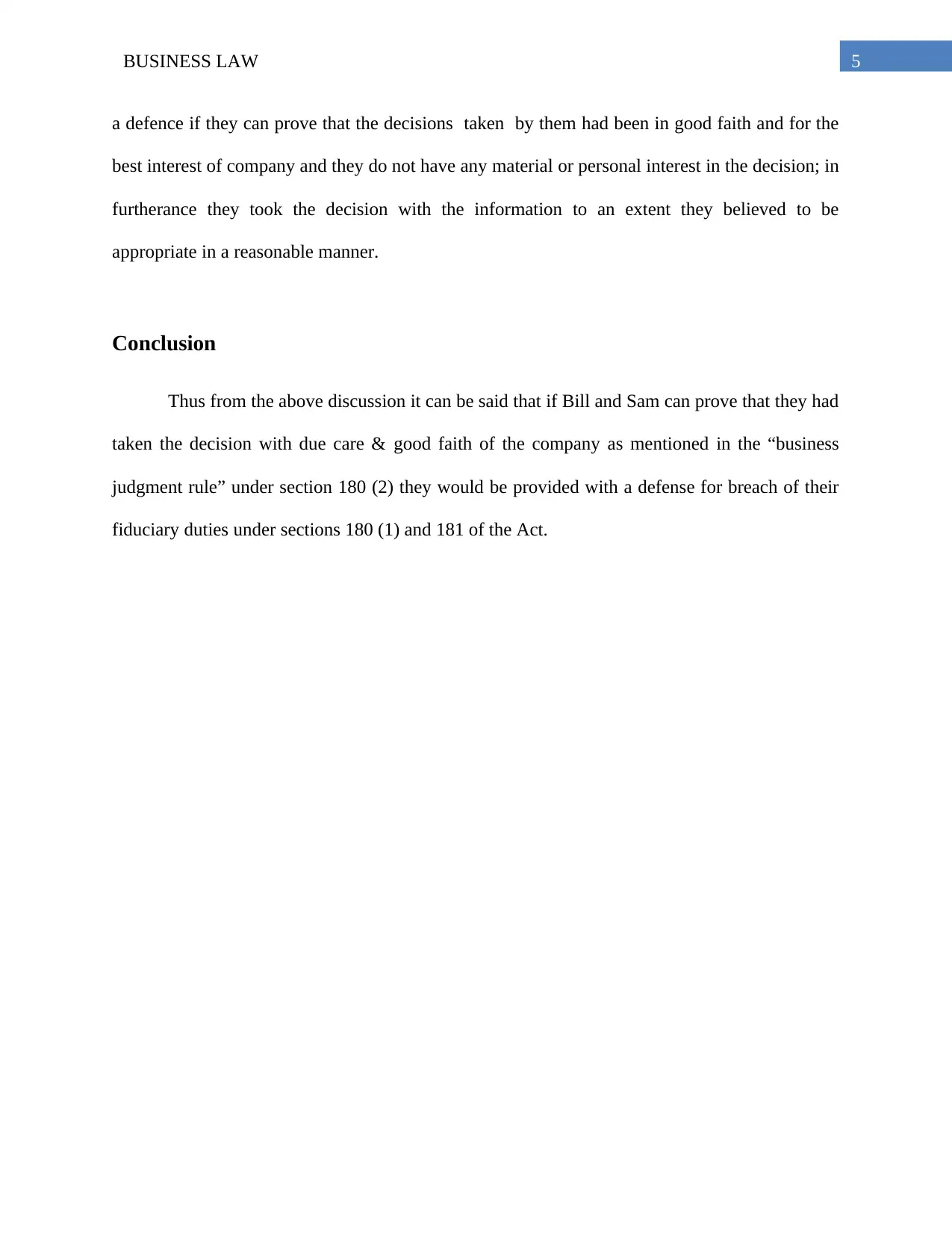
5BUSINESS LAW
a defence if they can prove that the decisions taken by them had been in good faith and for the
best interest of company and they do not have any material or personal interest in the decision; in
furtherance they took the decision with the information to an extent they believed to be
appropriate in a reasonable manner.
Conclusion
Thus from the above discussion it can be said that if Bill and Sam can prove that they had
taken the decision with due care & good faith of the company as mentioned in the “business
judgment rule” under section 180 (2) they would be provided with a defense for breach of their
fiduciary duties under sections 180 (1) and 181 of the Act.
a defence if they can prove that the decisions taken by them had been in good faith and for the
best interest of company and they do not have any material or personal interest in the decision; in
furtherance they took the decision with the information to an extent they believed to be
appropriate in a reasonable manner.
Conclusion
Thus from the above discussion it can be said that if Bill and Sam can prove that they had
taken the decision with due care & good faith of the company as mentioned in the “business
judgment rule” under section 180 (2) they would be provided with a defense for breach of their
fiduciary duties under sections 180 (1) and 181 of the Act.
⊘ This is a preview!⊘
Do you want full access?
Subscribe today to unlock all pages.

Trusted by 1+ million students worldwide
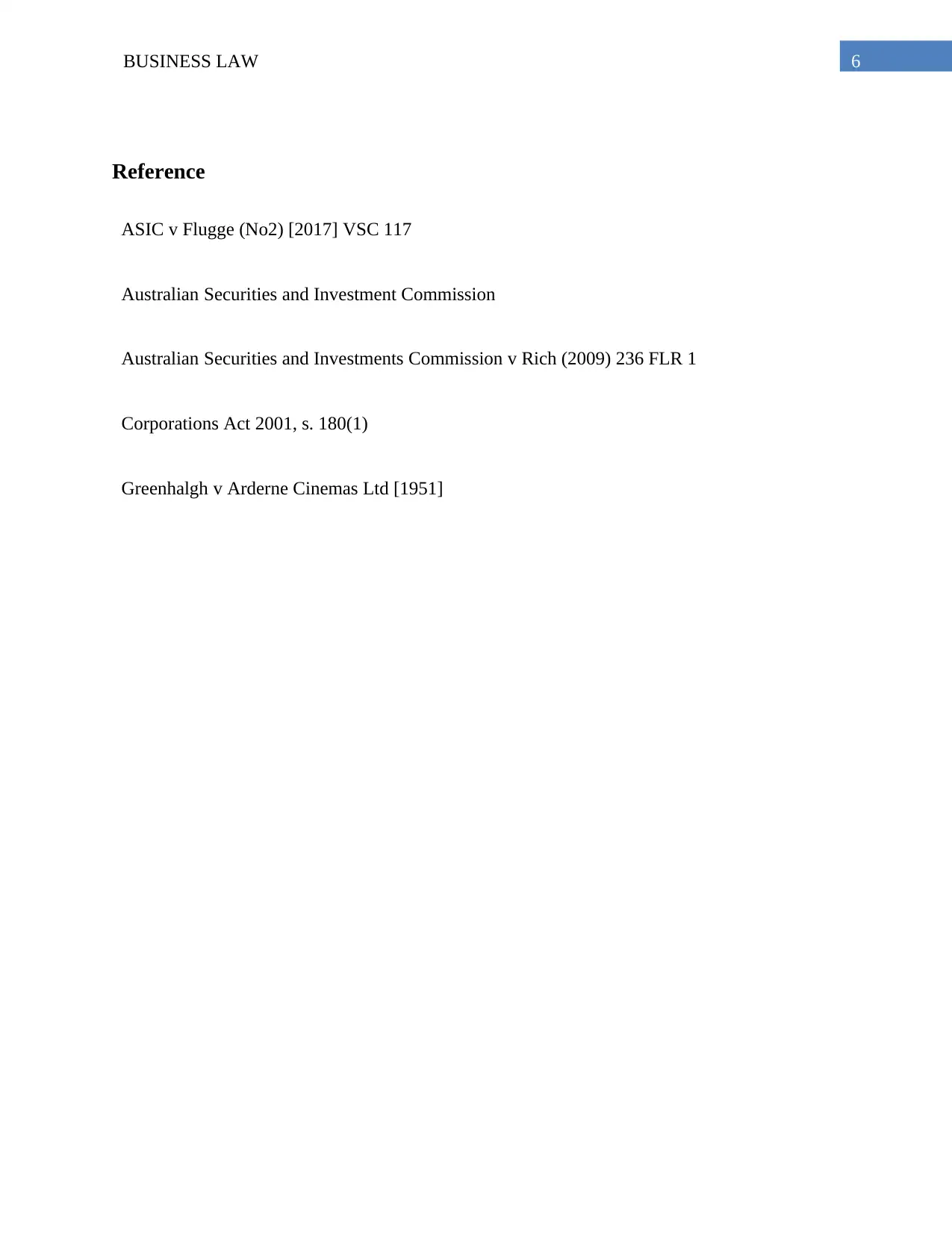
6BUSINESS LAW
Reference
ASIC v Flugge (No2) [2017] VSC 117
Australian Securities and Investment Commission
Australian Securities and Investments Commission v Rich (2009) 236 FLR 1
Corporations Act 2001, s. 180(1)
Greenhalgh v Arderne Cinemas Ltd [1951]
Reference
ASIC v Flugge (No2) [2017] VSC 117
Australian Securities and Investment Commission
Australian Securities and Investments Commission v Rich (2009) 236 FLR 1
Corporations Act 2001, s. 180(1)
Greenhalgh v Arderne Cinemas Ltd [1951]
1 out of 7
Related Documents
Your All-in-One AI-Powered Toolkit for Academic Success.
+13062052269
info@desklib.com
Available 24*7 on WhatsApp / Email
![[object Object]](/_next/static/media/star-bottom.7253800d.svg)
Unlock your academic potential
Copyright © 2020–2026 A2Z Services. All Rights Reserved. Developed and managed by ZUCOL.





